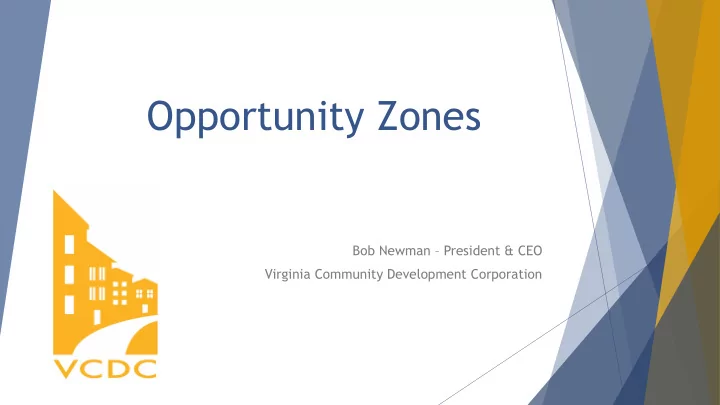

Opportunity Zones Bob Newman – President & CEO Virginia Community Development Corporation
What are Opportunity Zones? Created on December 22, 2017 as part of the “Tax Cuts and Jobs Act” Found in IRC Sections 1400Z-1 and 1400Z-2 Special Census Tracts Designated by Each State First Zones were approved in 18 states on April 9, 2018
What is a Qualified Opportunity Zone Investment? Capital Gains that are re-invested within six months into a Qualified Opportunity Fund The Qualified Opportunity Fund must in turn maintain at least 90% of its assets in Qualified Opportunity Zone Properties Percentage of assets calculated based on the average of investments at June 30 and December 31
What is a Qualified Opportunity Fund? An investment vehicle organized for the purpose of investing in Qualified Opportunity Zone Property Could be a corporation or a partnership Could probably also be an LLC (pending IRS guidance) Self-certified at tax filing
What is a Qualified Opportunity Zone Property? Stock or partnership interest in a business or property located in a Qualified Opportunity Zone Must be acquired after December 31, 2017 Business must be organized for the purpose of being a qualified opportunity zone business and; At least 50% of income derived from active conduct Substantial portion of intangible property used in active conduct of business <5% unadjusted basis of property is nonqualified financial property
What is Qualified Opportunity Zone Business Property? Tangible property used in a trade or business that is acquired from an unrelated party after December 31, 2017 During substantially all of the holding period, substantially all of the use is in a Qualified Opportunity Zone Either the original use is by the taxpayer, or the taxpayer makes substantial improvements to the property (defined as at least doubling the original adjusted basis within thirty months after acquisition)
Are any types of businesses ineligible? Cannot be a “Sin Business” Private or commercial golf course Country club Massage parlor Hot tub facility Suntan facility Racetrack or gambling outlet Liquor, beer or wine store
What are the Tax Benefits of a Qualified OZ Investment? Special Rules for Capital Gains Invested in Qualified Opportunity Zones Gain Deferral Partial Forgiveness Forgiveness of Additional Gains
Gain Deferral If the taxpayer invests its gains in a QOZ property within six months it is able to defer taxation on that gain until the sooner of its disposal of the property or December 31, 2026
Partial Forgiveness If the taxpayer holds the investment for at least five years, his/ her basis in the investment increases from $0 to 10% of the investment (making only 90% of the investment subject to taxation at exit) After seven years the taxpayer’s basis increases to 15% of the investment (making only 85% of the investment subject to taxation at exit)
Forgiveness of Additional Gain If the investment is held for at least ten years, all gains on the investment during the hold period will essentially be tax-free (basis will be stepped up to fair market value, thus no taxation on the appreciated value).
How do QOZ Investments Differ from 1031 Exchanges? In QOZ Investment only the gain must be re-invested within 180 days-- in a 1031 exchange, the entire value of the original property must be re-invested in order to defer taxation – also, no need to identify new investment after 45 days with QOZ as is required with 1031 exchanges In addition to deferral of taxation, a permanent reduction of up to 15% of the tax liability on the gain amount can be achieved over time in a QOZ investment-- such forgiveness is not available on 1031 exchanges There are no restrictions on the types of eligible gains that can be reinvested in QOZ Funds-- 1031 exchanges are limited to gains from the sale of real estate
Guidance is Still Needed from the IRS Does an LLC count as a partnership? Probably so, but this is unclear. Currently unclear how a property under construction or rehab could meet the asset test – would the existence of construction capital meet this test? Several questions about how the averaging of assets at 06/30 and 12/31 will work
Guidance is Still Needed From the IRS Some are concerned that residential leasing is not explicitly allowed (but it is not disallowed) No guidance for the meaning of “substantially all”– this phrase appears several places in the Code – will there be a definition or “safe harbor”?
Possible to Twin With LIHTC, but Some Challenges Exist in Structuring ➢ Reduced basis in an investment after year ten can create capital account issues ➢ LIHTC Investment Funds will have to be special purpose QOZ funds in order to meet the asset test ➢ Traditional LIHTC investors (i.e., banks) are not necessarily the best candidates to QOZ investments (i.e., they do not tend to have the type of predictable recurring gains that the QOZ was designed to shelter from taxation).
Discussion Questions Should we anticipate any problems resulting from the self-certification of Opportunity Funds? Will there be sufficient oversight from the IRS to prevent abuses? How can QOZs be used to further community development initiatives as opposed to being directed towards businesses that do not directly benefit the community at large?
Discussion Issues Will QOZ investments have a beneficial impact in lower income communities? There are few prohibited uses and no provisions for job creation or other low- income benefit Could QOZ investments have the effect of fanning the flames of gentrification?
Questions?
Bob Newman Virginia Community Development Corporation 1840 West Broad Street, Suite 200 Richmond, VA 23220 bnewman@vacdc.org 804-482-5387
Recommend
More recommend